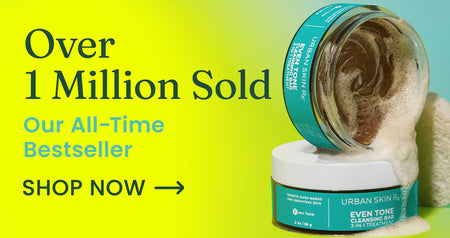What Ingredients to Look For When Choosing Moisturizer for Oily Skin

Many people consider oily skin to be a problem, but actually, oily skin has many benefits. The key is knowing how to care for it and understanding which ingredients to search for in products when doing so. Here’s a look at some of the best ingredients for oily skin.
Benefits of Oily Skin
Oil helps lock moisture in your skin barrier, keeping your skin moisturized during dry spells or cold winter months. An excess of oil production may be harmful and lead to breakouts of excessive acne, but really, the skin naturally produces oils to help moisturize, repair and protect your skin. Oil in your skin will protect your skin from showing signs of aging, and in many cases create a natural, dewy glow (and it’s good for anti-aging issues like fine lines!). While it might seem counterintuitive, remember that it’s just as important to moisturize oily skin as it is to moisturize dry to moderate skin. You might just want to consider a non-greasy oil-free moisturizer or one with a lightweight formula.
What Causes Oily Skin?
Oily skin is caused when there is an overproduction of sebum from your sebaceous glands. Excess oil production may stem from a multitude of factors, such as stress, anxiety, a shift in hormones, pollution or a poor skincare routine. You might also consider your diet—are you getting enough antioxidants and Vitamins C, E and A? It’s important to remember that the oil in your skin is one of your most valuable tools, and may actually aid your skin in appearing more buoyant, glowing and younger. Basically, forget what you’ve heard about oily skin! Oily skin breaks the stereotype. If you can learn to take care of it properly, hydrate it well, and not add even more oil to it with the products you choose, oily skin is not the nightmare you’ve heard it to be. The key—if you have oily skin—is to find the skincare routine that works for you, without caking on extra layers of potentially damaging products filled with excess oil. Using more oil on top of your oily skin will strip your skin of its moisture, preventing hydration and cause your dehydrated skin to produce even more oil. Choosing the right moisturizer and applying it regularly will cause your sebum levels to drop and your skin to become less oily.
Is Oily Skin Still Dehydrated?
This might seem like a strange paradox, but, the answer is yes: oily skin can still be dry skin. This is sometimes referred to as “oil-well in the desert” syndrome, meaning that even though there is a vast amount of sebum, the skin can still be dry and in need of a moisturizing agent.
Best Ingredients for Oily Skin
Knowing how to care for your oily skin is essential. It’s the difference between looking oily and looking fresh. When searching for a moisturizer to aid you in your quest for hydration, make sure you are looking for ingredients that rehydrate your skin and have been proven to be effective with oily skin.
It might feel counterintuitive to apply moisture to oily skin, but there is an important distinction between oil and moisture when it comes to skin. In fact, dehydrated skin can even increase oil production. Ingredients such as Glycerin and Ceramides can help. These are some of our favorite ingredients to treat oily skin that can be found in the best moisturizers!
- Glycolic Acid is an extremely important ingredient when treating oily skin. If you’re prone to recurring breakouts, using a product containing Glycolic Acid will help reduce the excessive amount of oil production that leads to them.
- Hyaluronic Acid is a common ingredient for moisturizing your skin that you’ll find in many serums and moisturizers. This will promote an increased moisture level in your skin.
- Salicylic Acid is another beneficial tool in combating oily skin. When dealing with breakouts that have stemmed from oily skin, this acid reduces redness and swelling, while breaking down dead skin cells and cleans your pores from the deepest point.
- Niacinamide (Vitamin B3) is responsible for promoting elasticity in your skin while minimizing pore size and monitoring the skin's oil production. Retinol is a powerhouse of a skincare ingredient as well. It is responsible for regulating oil production, relieving acne, reducing wrinkles and being all-around great for your skin.
- Retinol speeds up the rate of your skin cells’ turnover process, and in turn reveals bright, glowing skin.
- Clay works by soaking up oil from deep in your pores and bringing it to the surface. After using clay, you may feel like your face looks a bit matte. Follow this up with your moisturizing routine to avoid dry skin.
Ingredients to Avoid With Oily Skin
Just as important as learning what works well for oily skin, is learning what doesn’t. Compounds such as mineral oils, beeswax or any product with alcohol are absolute no's when treating oily skin, especially when it comes to face moisturizers.
Products with these compounds can clog your pores and trigger blemishes. Similarly, occlusives are one of the most common ingredients in moisturizers, but shouldn’t be used in conjunction with oily skin. Compounds in occlusives have a greasy texture and will likely cause more harm when treating oily skin.
When looking for products, whether at a drugstore or online, you’ll probably notice that these ingredients are increasingly common. The key is to search for products that contain high amounts of humectants and low amounts of occlusives.
- Face Oils with High Oleic Acid (Coconut Oil, Hazelnut Oil, Camellia Oil, Sunflower Oil)
- Occlusive Emollients
- Isopropyl Myristate
- Harsh Scrubs
- Artificial Dyes and Fragrances
Moisturizing Oily Skin: Tips
It is a common misconception that you should not moisturize oily skin. Really though, the question isn’t whether to moisturize oily skin, it’s how to moisturize oily skin. Here is a list of some of our favorite ways to gently and effectively keep your oily skin moisturized.
Moisturizer: Water Based or Oil Based?
Moisturizers generally come in two different forms: water-based or oil-based. If your skin is oily, you are going to want to use a moisturizer that is water-based to help promote balance in your skin. Using an oil-based moisturizer will only exacerbate oily skin further. Water-based moisturizers are not as potent as oil-based moisturizers; however, using a water-based moisturizer with natural humectants (substances that promote hydration in the skin) will help draw in moisture from the air and rehydrate your skin. A gel-cream is a good example of a water-based moisturizer.
Light Moisturizer
Finding a light moisturizer is the key when moisturizing oily skin. You’ll want to avoid heavy creams or lotions, as your oily skin will not have the ability to properly absorb it. As you might guess, using a thick cream will lead to the product laying on top of your skin, without ever being fully absorbed by your skin.
Non-Comedogenic Moisturizer
A non-comedogenic product is one that is specifically formulated to not clog pores. Using this kind of moisturizer lessens the chances of you getting clogged pores or enduring further acne. This means searching for products with primarily natural ingredients that will be able to gently penetrate the skin and clean out blocked pores without leaving a residue behind.
Familiarizing yourself with non-comedogenic ingredients is the first place to start when searching for a natural moisturizer. Here are some of our favorite non-comedogenic ingredients:
- Coconut Butter
- Avocado Oil
- Olive Oil
Eating and Hydration
Skin is the body's largest organ, so keeping it hydrated is essential in keeping it healthy. Maintaining a well-balanced diet and staying hydrated are key aspects that assist in your skincare routine.
This may sound like a broken record, but water is extremely important for skin health. Staying hydrated helps flush harmful toxins from your body, and promotes a glowing, buoyant complexion. You can include things such as green tea and watermelon which are hydrating and contain antioxidants.
On the flip side, consuming foods that are highly processed or cause swelling will likely create more toxins in your body. If you don’t stay hydrated, while also eating a diet consisting of high amounts of sugar, salt and processed fats, then you will create the perfect circumstance for swelling, pores to clog and acne to appear.
Other foods to avoid when combating oily skin are red meat, egg yolk, processed foods and dairy.
Environmental Factors
Some people are born with oily skin, and some develop oily skin as they age. The point being, some factors that lead to oily skin, we don’t have much control over. A variety of environmental factors may affect or promote oily skin.
Stress and anxiety can lead to an excess of oil production, along with a lack of sleep and exhaustion. Another environmental factor to be aware of that could be impacting your body's oil production is a hormone shift. This could likely be related to menstruation or pregnancy.
Developing Your Skincare Regimen
Developing a sustainable skincare regimen that is unique to you and your needs is key. It’s important to choose a pattern that cleanses your pores from the inside, tones and evens out your skin tone, and moisturizes your skin, rehydrating it in the process.
Sometimes carving out the time to stay consistent in your skincare habits takes a little time, and might even be the hardest part about developing a routine. But, once you do, you are set. Having a skin routine is hands down the most important thing you can do for treating your unique skin.
Keep It Clean!
Wherever your skin is in contact, make sure to keep it as clean as you can. The most prime examples being your pillowcases and make-up applicators. These everyday items can easily become the breeding grounds for bacteria to develop, and then attach dead skin cells to clog your pores.
If your skin is extra sensitive, try washing your pillowcase with a natural laundry detergent, or putting a few drops of essential oils with it while it dries to give it a nice scent that won’t irritate your skin. Similarly, when cleaning your make-up brushes or sponges, avoid harsh soap and instead opt for a natural, organic cleanser while cleaning under lukewarm water.
You don’t want to clean your make-up brushes with something that could further irritate your face, so make sure that anything in contact with your skin will also be gentle when in contact with you. Make sure when cleaning out the brushes that you wait to finish until all the makeup is squeezed out and all you see is clear water dripping out.
Spice Things Up
Let’s be honest, we get that it can be incredibly frustrating when dealing with your skin to not have instant results and to feel impatient waiting. One way to combat this frustration is by mixing up your routine a little. Try incorporating a naturally hydrating face mask into your weekly routine to give yourself something to look forward to. After you apply the face mask, gently cleanse your face and be careful to pat dry, never rub.
Don’t Be Too Hard on Yourself
Oily skin is not the enemy. In fact, there are actually a few hidden benefits to having oily skin as we’ve discussed. Remember that there are ways to treat oily skin that aid in rehydration, helping your oily skin and not just covering it up.
Trust the process of skincare and give your routine time to work, and try to remember that even if it takes a little time, oily skin is just another way to shine.
If you’re not entirely certain what type of skin you have or what products would fit your unique needs, try our Skin Quiz or book a virtual consultation with one of our in-house licensed aestheticians. Use our Melanin Experts Network to find a dermatologist that can address any skin concerns you may have.
Engagement Manager



